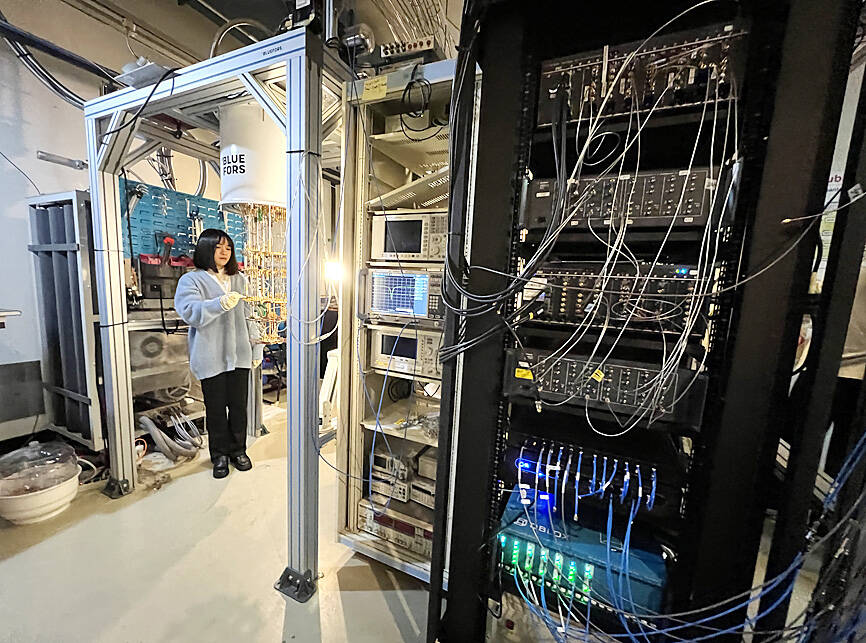A team at the Industrial Technology Research Institute (ITRI) has found a way to use a microwave integrated circuit (IC) and Taiwan Semiconductor Manufacturing Co’s (TSMC) 28-nanometer technology to develop a low-temperature-control IC module, which can potentially reduce the size of a quantum computer by 40 percent, the institute said on Wednesday.
The National Science and Technology Council announced some of the progress it has made with Academia Sinica and the Ministry of Economic Affairs since 2021 in jointly developing quantum technologies.
The more quantum bits (qubits) a quantum computer possesses, the more information it can carry and the better it can work.

Photo: CNA
Sheu Shyh-shyuan (許世玄), a division director at the ITRI’s Institute of Electro-Optics and the head of a project on the key hardware of quantum computer subsystems, said that a quantum computer is equipped with a fridge, other devices and a crowd of cables for connections, which in combination can easily take up a whole room.
One qubit requires two to three cables, so if a 100-million-qubit system is to be realized, that would mean 300 million cables, with the size of the control device and the system for cooling scaled up accordingly.
As a result, power consumption would surge considerably, Hsu said.
It is for this reason that “minimization” is a trend in quantum computing, he said.
He said that his team utilized microwave IC design and TSMC’s 28-nanometer process technology, which are national strengths, to develop low-temperature (minus-269°C) control chips and modules to make control devices smaller and place them in a low-temperature fridge.
The design could reduce the size of the system by about 40 percent, highlighting the potential for it to be commercialized, Hsu said.
The minimization of the module can also shorten the route needed for quantum signal transmission and reduce the interruption of noise, Hsu added.
The module also cuts power consumption by more than 50 percent compared with results published by major international developers, making it an advantage for developing multiple-qubit superconducting quantum computers, he said.
The technology could be transferred to domestic companies, Hsu said, adding that some have already made inquiries about possible cooperation.
Executives from Finland-based quantum computer company IQM visited Taiwan last year to discuss possible cooperation, Minister of Science and Technology Wu Tsung-tsong (吳政忠) said, adding that Taiwan, despite competing globally with limited funds, has achieved substantive results in quantum technology and is likely to become one of the nations with most potential to excel at it.

South Korean K-pop girl group Blackpink are to make Kaohsiung the first stop on their Asia tour when they perform at Kaohsiung National Stadium on Oct. 18 and 19, the event organizer said yesterday. The upcoming performances will also make Blackpink the first girl group ever to perform twice at the stadium. It will be the group’s third visit to Taiwan to stage a concert. The last time Blackpink held a concert in the city was in March 2023. Their first concert in Taiwan was on March 3, 2019, at NTSU Arena (Linkou Arena). The group’s 2022-2023 “Born Pink” tour set a

CPBL players, cheerleaders and officials pose at a news conference in Taipei yesterday announcing the upcoming All-Star Game. This year’s CPBL All-Star Weekend is to be held at the Taipei Dome on July 19 and 20.

The Taiwan High Court yesterday upheld a lower court’s decision that ruled in favor of former president Tsai Ing-wen (蔡英文) regarding the legitimacy of her doctoral degree. The issue surrounding Tsai’s academic credentials was raised by former political talk show host Dennis Peng (彭文正) in a Facebook post in June 2019, when Tsai was seeking re-election. Peng has repeatedly accused Tsai of never completing her doctoral dissertation to get a doctoral degree in law from the London School of Economics and Political Science (LSE) in 1984. He subsequently filed a declaratory action charging that

The Hualien Branch of the High Court today sentenced the main suspect in the 2021 fatal derailment of the Taroko Express to 12 years and six months in jail in the second trial of the suspect for his role in Taiwan’s deadliest train crash. Lee Yi-hsiang (李義祥), the driver of a crane truck that fell onto the tracks and which the the Taiwan Railways Administration's (TRA) train crashed into in an accident that killed 49 people and injured 200, was sentenced to seven years and 10 months in the first trial by the Hualien District Court in 2022. Hoa Van Hao, a